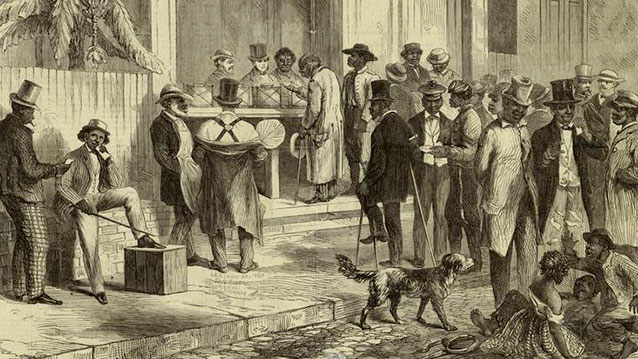EVANSTON, Ill. --- The National Park Service, which preserves many Civil War sites, has commissioned historians Kate Masur and Gregory P. Downs to conduct the first comprehensive review of nationally significant historical sites of the U.S. Reconstruction Era.
The project, titled a “National Historical Landmark Theme Study on the U.S. Reconstruction Era, 1861-1898,” is designed to bring attention to the history of the period after the Civil War and identify landmarks that help tell the nation’s story, according to the Park Service.
Northwestern University’s Kate Masur, associate professor of history at the Weinberg College of Arts and Sciences, will coauthor the report with Gregory P. Downs, associate professor at the City College of New York.
Masur and Downs pointed out in an article published in The Atlantic that the Reconstruction Era has long been ignored by the Park Service.
“Reconstruction was defined by the questions of race and power … that flowed logically and continuously out of the Civil War,” they wrote in The Atlantic. “Those questions reverberate in many political debates today -- debates over the meaning of equal protection of the law, over the right to vote, and over the limits of presidential and congressional authority, both in peacetime and in war.
Now, on the cusp of significant Reconstruction anniversaries, the Park Service is ready to change how Americans remember Reconstruction,” the article continued, “to help push the era -- in all its complexity -- back onto the map of America’s collective memory.”
In their work for the Park Service, Masur and Downs will write a study that describes the history of Reconstruction and surveys potential sites where that history could be commemorated.
The period was a defining one in the nation’s history, Masur said. Millions of former slaves worked to build new lives in freedom -- to reunite families separated by slavery, build schools and churches, purchase land and exercise basic rights. It was also an important period in federal policy, as Congress passed measures designed to abolish slavery, guarantee basic civil rights and prevent race-based discrimination in voting rights.
“The incredible hopes of that period and the tragedy that many of those hopes went unrealized can make this a difficult period to talk about,” Masur said. “But that’s one reason it’s particularly gratifying to be part of this project.”
Masur and Downs will conduct a yearlong study that will compile information from historians, state historical societies and area communities to determine which sites capture the essence of Reconstruction’s history. This project follows the recent creation of a handbook on the history of Reconstruction that will soon be available at National Park Service sites.
-- Story by Elizabeth Owens-Schiele, a writer for Northwestern University Media Relations


